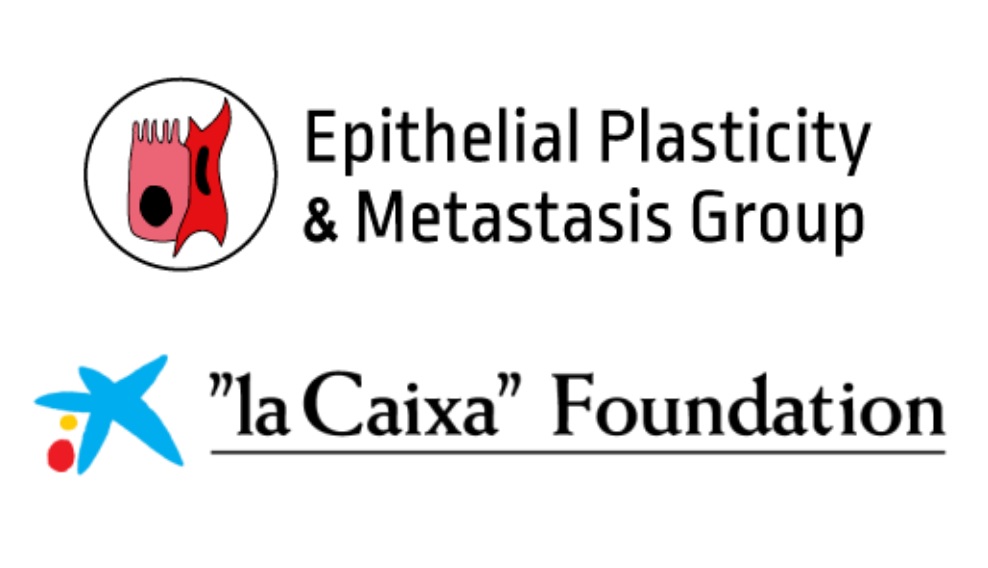Call for applications for a doctoral fellowship position at the Epithelial Plasticity and Metastasis Group (INPhINIT programme)
 Open call for a doctoral fellowship position at Dra. Figueroa’s Research Group (Epithelial Plasticity and Metastasis Group) with the support of ”la Caixa” Foundation (INPhINIT programme)
Open call for a doctoral fellowship position at Dra. Figueroa’s Research Group (Epithelial Plasticity and Metastasis Group) with the support of ”la Caixa” Foundation (INPhINIT programme)
The doctoral fellowship programme INPhINIT ”la Caixa” is devoted to attracting talented Early-Stage Researchers—of any nationality—who wish to pursue doctoral studies in Spanish or Portuguese territory.
The Dra. Figueroa Research Group works on understanding the molecular mechanisms involved in epithelial plasticity programs such as the epithelial-mesenchymal transition (EMT) and its clinically implications during tumor progression, metastasis, stemness and drug resistance. Metastases are responsible for around 90% of cancer deaths; however, despite the great advances reached in understanding the molecular mechanisms involved in the invasion and metastasis process, the control of the dissemination of this disease remains one of the major challenges that cancer research still faces today. carcinoma, the most common type of cancer, arises from the transformation of epithelial cells. At early stages of tumor progression and carcinoma metastasis, epithelial tumor cells activate a crucial program named epithelial–to–mesenchymal transition (EMT), which has emerged as a key regulator of metastasis in some cancers such as colon cancer by conferring an invasive phenotype. Cancer-associated EMT is characterized by the disruption of cell–cell contacts, cell–substratum adhesions and apical–basal polarity, accompanied by the reorganization of the cytoskeleton. All these changes cause the loss of epithelial phenotype and the acquisition of a mesenchymal phenotype, which includes a gain of migratory and invasive capabilities, important for the dissemination of cancer cells. EMT has been also implicated stemness and cancer drug resistance highlighting the potential to develop pharmacological therapies to target epithelial plasticity in cancer. The Epithelial Plasticity and Metastasis Group, led by Dra. Angélica Figueroa, is constituted by basic and clinic researches involved in understanding of the molecular mechanism by which EMT influence metastasis, resistance and stemness and to develop novel therapeutic strategies that can be transfer our to the clinic and to the market.
Job position description
The global objective of this project is determine the role of novel drug targets in EMT, stemness and drug resistance and to identify new antitumor compounds in order to develop novel therapeutic strategies that can be transferred to the clinic and to the market. The phD position will combine molecular and cellular biology methodology and microscopy, using in vitro, ex vivo and in vivo models, including cultures of tumor lines in 2D and 3D (spheroids, organoides,) as well as using tumor cell xenoimplants in immunosuppressed mouse models. Moreover, clinical samples will be used including tissue biopsies and serum/plasmas from cancer patients. The PhD candidate will work on this project and is also expected to participate in the group activities (seminars, courses, conferences, etc.), and have regular meetings with his/her supervisor.
Requirements for candidates
- At the closing date for submitting applications, candidates must be in the first four years (full-time equivalent research experience) of their research careers and not yet have been awarded a doctoral degree.
- At the time of recruitment, candidates must comply with one of the following options:- To have completed the studies that lead to an official Spanish or Portuguese (or from another country of the European Higher EducationArea) university degree awarding 300 ECTS credits, of which at least 60 ECTS credits must correspond to master level.- To have completed a degree in a non-Spanish or non-Portuguese university not adapted to the European Higher Education Area that givesaccess to doctoral studies. The verification of an equivalent level of studies to the ones mentioned above will be made by the university whenthe admission procedure starts.
- Mobility Rule: For doing their research at Spanish institutions, candidates must have resided in Spain for less than 12 months in the last 3 years immediately prior to the closing date for submitting applications. For doing their research at Portuguese institutions, candidates must have resided in Portugal for less tan 12 months in the last 3 years immediately prior to the closing date for submitting applications. Short stays such as holidays will not be taken into account when calculating the mobility requirement.
- Demonstrable level of English (B2 or higher).
For more information: [ downolad]
Research group website: [ click here]
Back to Events / News
